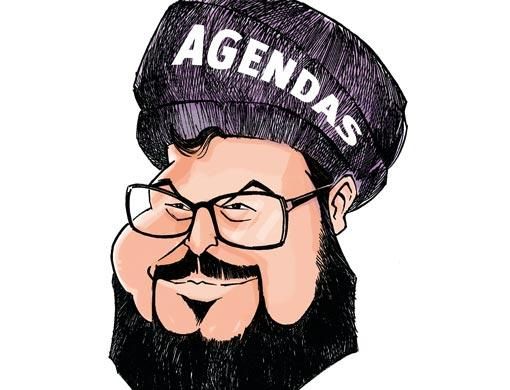Hezbollah leader Hassan Nasrallah found an unlikely fan in controversial Lebanese singer Haifa Wehbe. The green-eyed beauty, best known for her seductive numbers, said she appreciated Nasrallah's battle to defend the land and people of Lebanon.
Meanwhile, famous Lebanese patriotic singer Julia Butrous, who lives in Dubai, dedicated her latest song, titled My loved ones, to her new "loved ones" Hassan Nasrallah and the heroes of the Islamic resistance in Lebanon.
This flow of admirers coincides with Nasrallah's unprecedented internal confrontations and threats to encourage the public to take to the streets and bring down Lebanon's government headed by Prime Minister Fouad Siniora. This indicates that Nasrallah has a hidden agenda, other than his announced national Lebanese agenda.
Hezbollah, which always enjoyed special respect, is about to lose this respect. And even though Nasrallah is highly admired across the Arab and Islamic worlds, his language of threats raises doubts on the agenda of the most popular leader among 1.2 billion Muslims.
The leader, who suddenly raised political and sectarian tension in Lebanon, has a character that can easily change skin, move from one side to another, wear different masks and have contradicting strategic, political and ideological agendas.
Nasrallah's agenda seems as much Syrian as Lebanese. He stands with one foot in Lebanon, and the other firmly set in Syria and defends the south of Lebanon, its army and militias as much as he defends the Syrian presence and its political and intelligence services in Lebanon, even if this incites the other sides.
Strategic relations
Swinging between Damascus and Beirut, Nasrallah acts as if he were both Lebanese and Syrian. He would go as far as he needs to use Syrian protection, and employ his strategic relations with Syria to achieve gains and demand concessions against the Lebanese constitution.
He simply managed to be with and against Lebanon, simultaneously. Until his ministers withdrew from the government lately, Nasrallah always insisted on being present in both the government and the opposition that works to topple it.
Hezbollah's political participation in the government did not stop Nasrallah from condemning it and fighting to overthrow the prime minister, who fought on political and diplomatic fronts to cover up for Hezbollah's fatal errors.
This only proves that the charismatic leader has a selfish and Machiavellian character, which works to implement a sectarian agenda without consideration of national interests.
The most obvious evidence of the Machiavellian nature of Nasrallah's character is his insistence on holding the reins of both politics and resistance. He leads an independent army and a resistance that monopolises defence in southern Lebanon.
His party possesses more than 20,000 missiles and an advanced arsenal, which exceeds that of the Lebanese Army.
However, the leader who claims that he has achieved "divine victory" is acting above all other Lebanese parties, which have adhered to the Taif Accord and willingly dropped their weapons.
Unlike other leaders who are represented in the government, Nasrallah has unacceptable demands and tries to impose an agenda that does not suit the war-torn Lebanon, especially after the last Israeli aggression that cost the country more than $11 billion.
Liberating Sheba'a Farms, freeing prisoners of war and forming a national unity government are Nasrallah's announced targets.
However, no one can deny that the leader is a student of Ayatollah Khomeini's school. Nasrallah himself does conceal that he wishes to establish an Islamic state in Lebanon, as part of an Islamic Middle East that is loyal to Iran.
Although Nasrallah believes that fulfilling this wish is not currently possible due to Lebanon's unique situation, he still cannot give up this dream. All his political manoeuvres have one target, which is this strategic agenda.
It is no secret that Iran is the creator of Hezbollah, which is its cheapest, yet most profitable investment in the Arab region. And it is well known that Tehran attempts to promote its project as an alternative to the American agenda.
Best bet
To achieve this, Iran's best bet is to trigger sectarian tension in Lebanon, Iraq and the whole region, a purpose served to a great extent by the resignation of Hezbollah's ministers, which further proves that Nasrallah is more of a sectarian leader than a national leader.
Regardless of the nature of his agendas, there is no doubt that Nasrallah is as clever in politics as he is in resistance. He is military, civil, practical, ideological, mysterious and clear at the same time.
He destroys, and swiftly rebuilds, and through all remains the most attractive Arab and Islamic character. Some admire him for defending his land and his people while maintaining an attractive smile and manly character.
Some are willing to sacrifice their lives for the man they placed next to saints, for his honesty and integrity, and others are stunned by his victory against the region's mightiest army.
This, however, is no excuse for the fatal errors committed against Lebanon by Nasrallah and his party, the latest of which is the resignation of Shiite ministers from the Lebanese government, causing sectarian tension to heat up and ultimately pushing this Arab country towards the edge of the cliff.
Dr Abdulkhaleq Abdullah is a professor of political science at the UAE University, Al Ain.









